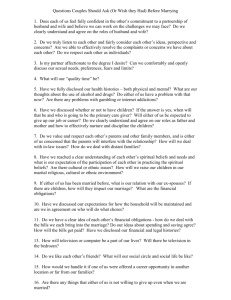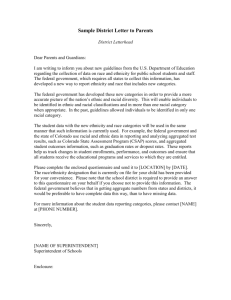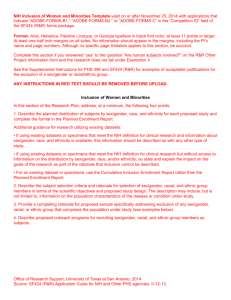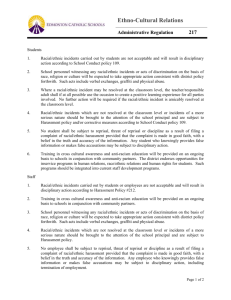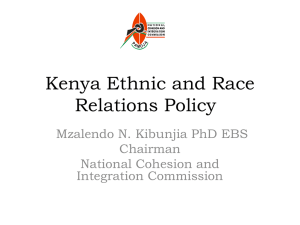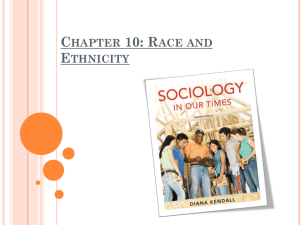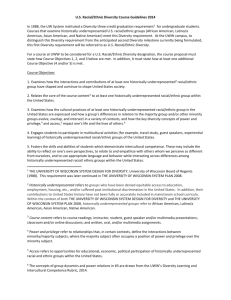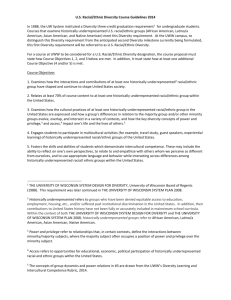ethnic and racial histories power point presentation
advertisement
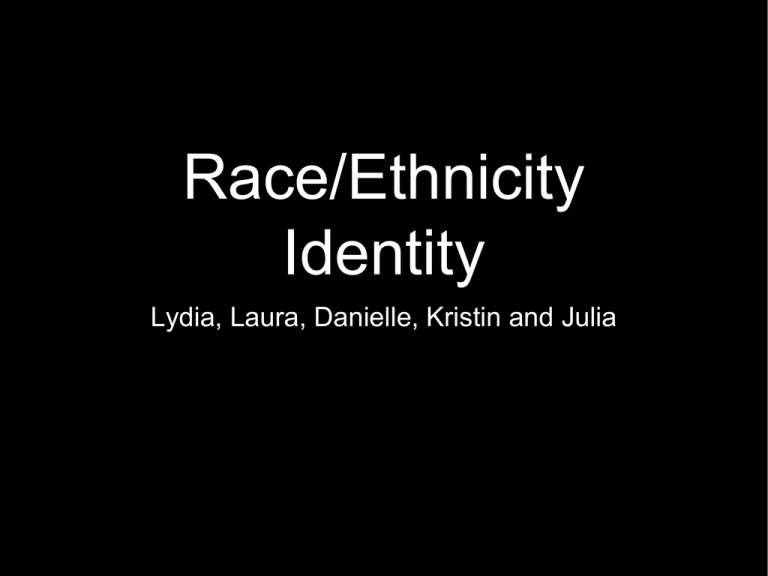
Race/Ethnicity Identity Lydia, Laura, Danielle, Kristin and Julia First, a Youtube video and a disclaimer! • http://www.youtube.com/watch?v=6GgjgFbp8-M • This presentation is not meant to offend anyone, we apologize for any awkwardness that may be felt during this presentation. Where are we going? -First, definitions of these wonderful words. -We’re going to talk about acceptance and resistance! -Then we’ll talk about Family and Cultural Histories! -We’ll then apply it to various things around MC! -Finally, we’ll wrap up! Definitions! •Racial and ethnic identity-Identifying with a particular racial or ethnic group. Although in the past racial groups were classified on the basis of biological characteristics, most scientists now recognize that race is constructed in fluid social and historical contexts. •Racial histories-The histories of nonmainstream racial groups. •Ethnic histories-The histories of ethnic groups. identity-A set of ideas about one’s own ethnic group membership; a sense of belonging to a particular group and knowing something about the shared experience of the group. •Ethnic We’re a Majority! • • Resistance • The act of blaming minority members for their conditions to blaming the social system as the source of racial or ethnic problems. • You’re never JUST American, you are also Irish, German, French, Native American, etc. • In America, individuality is stressed, if you are just white, you are not an individual. Acceptance • assumption that people of other colors are culturally different--whites are all of the same, with no specific culture, identity or shared experience. Whiteness. •3 characteristics of being White. • an advantage of race privilege • a standpoint from which white people view themselves, others & society • a set of cultural practices, largely unrecognized by white people •Economic • Black households earned 60% as much income as a White household; Latino households made 70% •Health • issues: and Longer Life expectancies: Black women are 2 times more likely to have stillborn children than White women •Social privileges: • Whites are rarely asked to speak for their entire race • Whites see people who “look like them” wherever they go FAMILY HISTORIES • Definition: The body of knowledge shared by family members and the customs, rituals, and stories passed from one generation to another within a family. • Example: Many families changed their last name when they came to America to: • • • • Get jobs Have a more “americanized” identity Fit in with the new culture Allow for easier spelling EXAMPLES OF LOSING FAMILY HISTORIES -It is important for older family members to share the family history so as not to lose it. -Family history is also lost because of parents dying before they can tell their children about it. -If one member of the family is adopted, the family may lose that part of their history. ~Some adopted people do not know their background because they have never met their parents. • CULTURAL HISTORIES Definition: The history of each cultural group within a nation that includes, for example, the history of where the group originated, why the people migrated, and how they came to develop and maintain their cultural traits. Example: “Whiteness” is not a big deal now, but when people were immigrating here, it was a big deal. Italian and Irish people, even though they were white, had a hard time assimilating and getting jobs simply because of their backgrounds. Example: We identify people by looks. If they “look” Chinese, even if they aren’t, we identify them as Chinese. People from other countries simply identify with their country. They do not think about being “Irish-British” as we do as White Americans. Why are Jesus, Santa Clause, and the Easter Bunny always depicted as white? Influence of identity on communication •Extracurricular Activities on campus • M.C.I.A.- Manchester College International Association • H.U.- Hispanos Unidos • B.S.U.- Black Student Union • A.S.A.- African Student Association • A.A.A.- Asian Awareness Association Influence of identity on communication •Residential Interactions • living in a dorm • floor programs • dating outside your race Closing time! • Many people who are white don’t think about it in their everyday business. • • • Americans don’t like to associate with just being white, they are also other ethnic groups. White family and cultural histories are passed down throughout generations, with Santa being white instead of a different race. Whiteness affects us in our communication between people in our residence halls as well as extracurricular activities.

